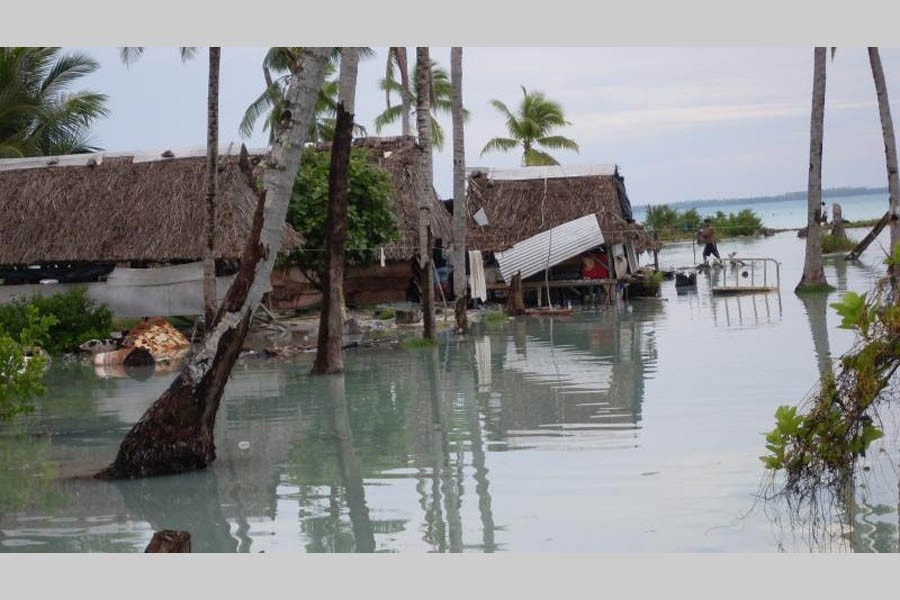Acting on UN draft plan for mobilising funds
BD preparing disaster risk financing strategy
IMF team due Sunday to provide technical assistance

Published :
Updated :

Bangladesh is set to prepare National Disaster Risk Financing Strategy on International Monetary Fund (IMF) suggestion to mobilise local and foreign funds for recouping damages perennially wrought by natural calamities.
Bangladesh is set to prepare National Disaster Risk Financing Strategy which the government committed to the International Monetary Fund (IMF) to adopt by the end of June this year.
A team of the IMF is due in Dhaka tomorrow (Sunday) for discussions on preparation of the disaster risk-financing strategy for which the multilateral lender will also provide necessary technical assistance to Bangladesh as the country is one of the most climate-vulnerable nations.
Adoption of this strategy--by the end of June this year--is one of the prioritised reform measures which is considered a "high feasibility, medium urgency" in Country Climate and Development Report (CCDR) also discussed with the World Bank (WB) as an important reform area.
Bangladesh has been conducting a number of reforms under the terms of a US$4.7-billion loan package of the IMF. The loan has been given to help Bangladesh restore macroeconomic stability amid severe financial stresses.
The government recently adopted National Adaptation Plan (NAP) which estimates adaptation investment totalling $230 billion between 2023 and 2050.
According to a World Meteorological Organisation (WMO) report, Bangladesh incurred losses worth nearly $11.3 billion in 2021 alone owing to climate-induced natural disasters, which accounts for about 2.47 per cent of its gross domestic product or GDP for the FY2021-2022.
The IMF in a recent note indicated that the annual average damages to Bangladesh from tropical cyclones alone have already reached $1.0 billion or 0.7 per cent of the GDP.
In the budget for the fiscal year 2023-24, the government has earmarked Tk 370 billion as the climate-relevant allocation for 25 ministries and divisions, some 8.99 per cent of their total budget, a big burden for the country, finance officials said.
With disaster-linked spending rising every year the government is now asking the relevant ministries and departments concerned to step up efforts to mobilise more funding from both foreign-and private-sector sources.
"Climate-responsive public financial management and infrastructure investment are key to Bangladesh's long-term sustainable growth," the IMF said in 2023 Article IV Consultation report.
Developing a national disaster risk-financing strategy that integrates social assistance measures would help to target building resilience for the most vulnerable groups, it notes.
A senior finance ministry official told the FE Thursday that the IMF team will have meetings with different wings of the finance division where they will discuss budgeting and allocations for disaster-related spending, consideration of disaster risks in macro-fiscal planning, public financial-management guidelines and process relevant for disaster-risk financing and existing funds and mechanisms in the budget for disaster response.
At a meeting with the officials of the ministry of disaster management and relief, the team will have discussions about the disaster risk-management framework, disaster-management fund, social-assistance programme for disaster response and relief, and disaster risk-response budgeting.
With the ministry of environment, forest and climate, the team plans to discuss disaster-risk management as part of national climate policy, climate finance and disaster-risk finance and international climate funds, and the policies to support disaster-risk reduction and response.
The IMF mission will also have a number of meetings with relevant ministries and departments concerned during its fortnight-long stay in Dhaka.
In January this year, the United Nations office in Dhaka submitted a draft of the Disaster Risk Reduction Financing Strategy to the government for review. The draft is now being finalised.
"The primary purpose of this draft risk-financing strategy is to financially protect the most vulnerable segments of society. Investments in disaster-risk reduction will safeguard Bangladesh's economy and total factor productivity, preserving the trajectory of economic development," wrote Gwyn Lewis, UN Resident Coordinator in Dhaka, in a letter to the finance secretary.
syful-islam@outlook.com


 For all latest news, follow The Financial Express Google News channel.
For all latest news, follow The Financial Express Google News channel.